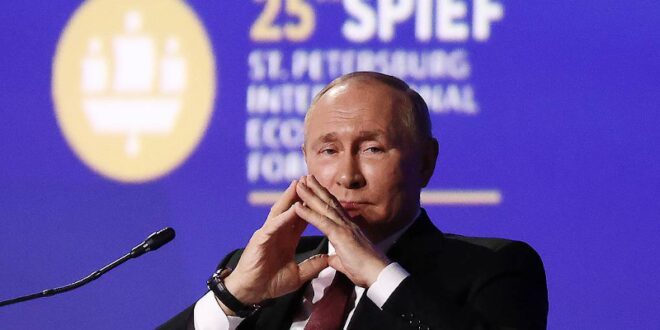At the plenary session during the 25th year of St. Petersburg International Economic Forum (SPIEF), Russia’s President Vladimir Putin lambasted the United States and its Western and European allies, wholeheartedly predicted the end of the unipolar system and bristled at the idea of creating a new global order that might ensure equality and drastically change living standards of impoverished millions around the world.
Putin believes that the United States sees itself as a “messenger of God on Earth”, who has interests but no responsibility. “The United States is ostensibly unaware that over the past decades new powerful centers have emerged around the globe and their voice is heard ever louder. Each of them is developing its own political system and public institutions and implements its own model of economic growth and, of course, has the right to protect them and to ensure national sovereignty,” Putin stressed.
While emphasizing the problems currently faced by the world’s economy at large, unfair competition among states, trade and financial wars, sanctions, restrictions, and so on, he asserted that the era of the unipolar world order has ended. The United States for the sake of ambitions and in the name of preserving outdated geopolitical illusions really don’t understand that the world based on such dogmas is definitely unsustainable.
In his opinion, “we are witnessing objective processes and truly revolutionary tectonic changes,” in the world. “After claiming victory in the Cold War, the United States declared it was the messenger of God on Earth, who has no obligations, but only interests – and these interests are sacrosanct,” Putin said
A world order based on the dogmas of unipolarity is unstable. Western elites are largely “clinging to ghosts of the past,” thinking that Western dominance is “an unchangeable and everlasting thing. Nothing lasts forever.”
A new world order is still emerging but it’s clear that its rules will be created by those “who aren’t moving along a path set out by others.” “Only strong and sovereign states can have a say in this emerging world order or they will have to become or remain colonies with no rights,” Putin noted.
He further described as “thoughtless” and “insane” unprecedented sanctions imposed on Russia by a number of Western countries. “The idea was clear: crush the Russian economy violently, in a swoop, and deal a blow to industries, finance and living standards of people by destroying business chains, forcibly pulling Western companies out of the Russian market and freezing domestic assets,” he said.
Putin highlighted six principles constituting the basis for development of the national economy during the forum. These are openness, reliance on freedoms of entrepreneurship, balanced macroeconomic policy, social justice, advanced development of infrastructure and achievement of technological sovereignty.
State sovereignty cannot be partial or fragmentary in the 21st century, all of its elements have equal importance. They reinforce and complement each other. That is why it is important not only to defend the political sovereignty and national identity, but also to strengthen everything that ensures the country’s economic independence, its self-sustainability and independence in the matters of finances, workforce and technology,” Putin explained.
The president said that Russia changed in recent years through a planned effort to create a sustainable macroeconomic structure, ensure food security, enable import substitution and establish its own payment system. Nevertheles, the sanctions have brought about “numerous difficult tasks” that Russia has to solve, he continued. “On the other hand, this situation creates new opportunities for us. We are saying this quite often, but this is really so. All of this will be an incentive to build an economy whose technological, production, workforce and scientific independence and potential is full rather than partial,” Putin said.
In a clear and concise but tense language, he expressed optimism that Russia would become stronger than before, taking advantge of emerging opportunities and new initiatives to build a better country. With Russia under wide sanctions after sending troops into Ukraine, Putin spoke at length acknowledging the economic difficulties Russia faces as it tries to promote itself to international businesses, the evolutionary processes in the new global configuration.
Chinese President Xi Jinping and Egyptian President Abdel Fattah el-Sisi, by video link, took part in a plenary meeting together with Russian President Vladimir Putin and Kazakh President Kassym-Jomart Tokayev. The forum brought representatives from Latin America, Africa and mostly from Asia. There were a number of international organizations as well as representatives from more than 90 countries, compared to 140 the pre-corona pandemic years.
Under the chosen theme ‘New Opportunities in a New World’ that reflects the changing global situations, the conference from June 15 to June 18 marked the 25th year of the St. Petersburg International Economic Forum (SPIEF) since its establishment. Over the last 24 years, the forum has become a leading global platform for members of the business community to meet and discuss the key economic issues facing Russia, emerging markets, and the world as a whole. Since 2006, has been held under the auspices of the President of the Russian Federation.
 Eurasia Press & News
Eurasia Press & News




